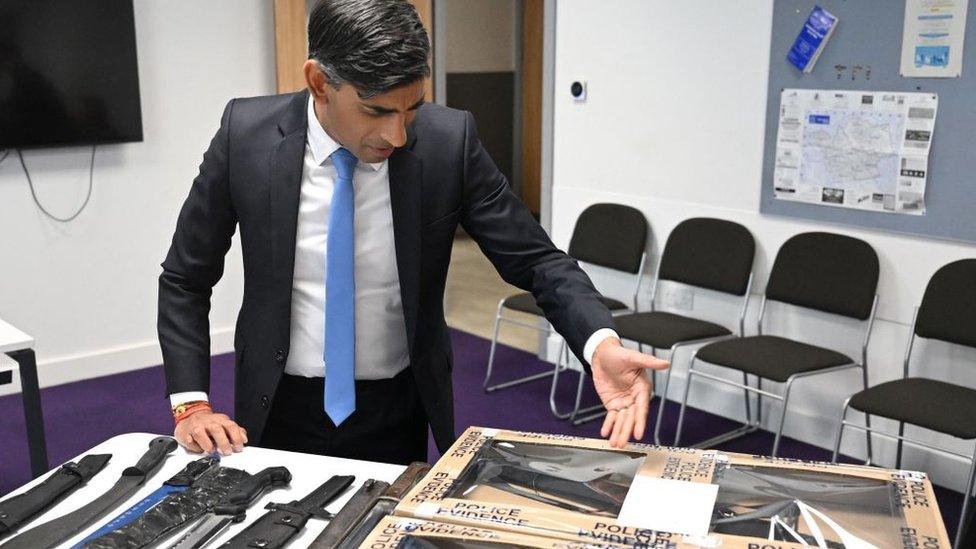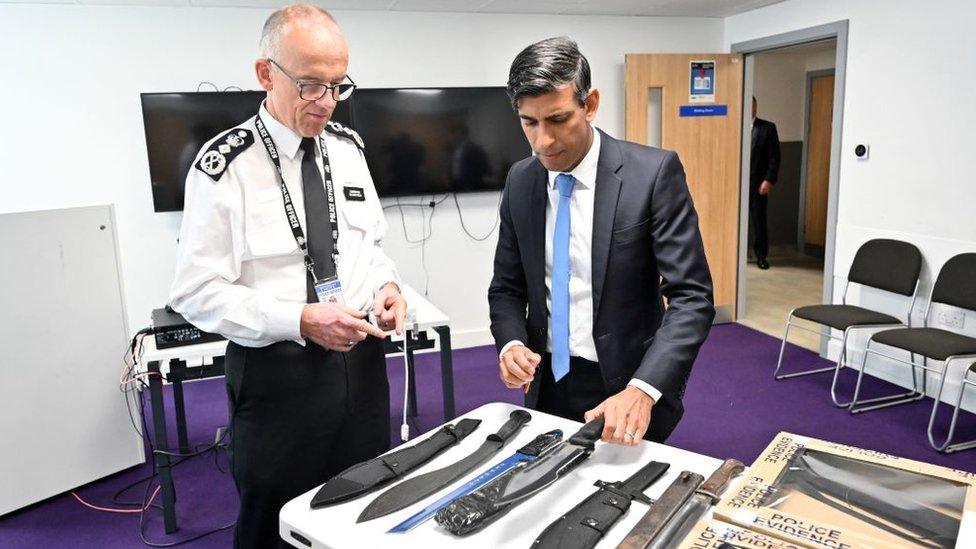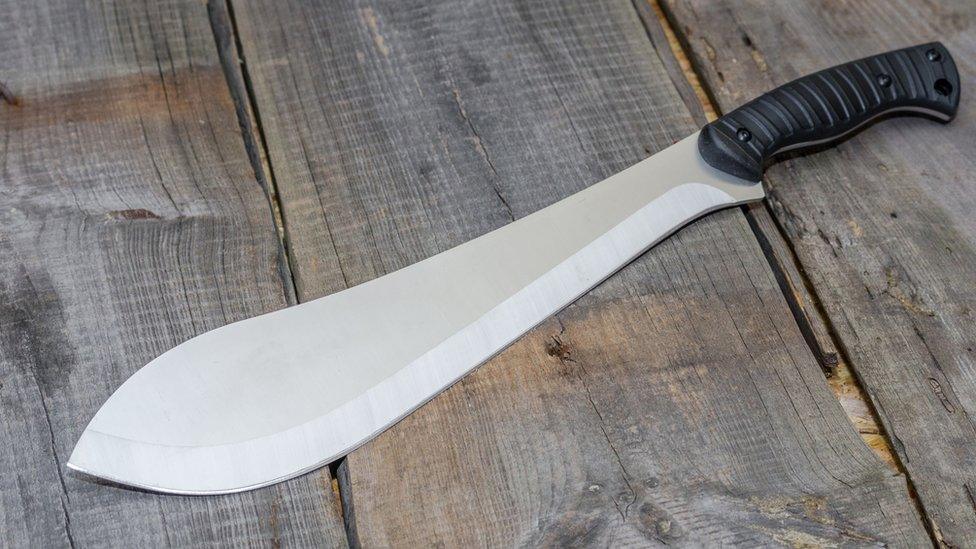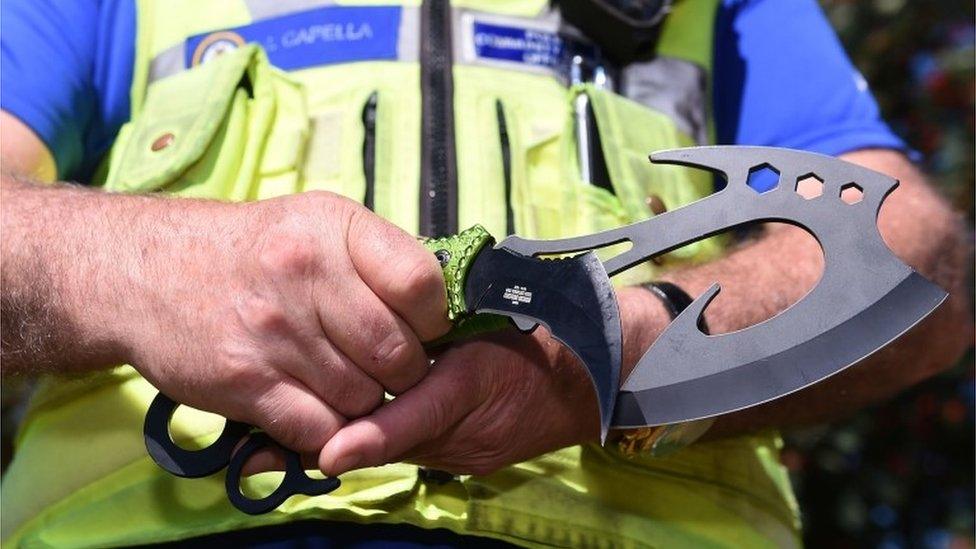New zombie knife police powers to tackle violence
- Published

Prime Minister Rishi Sunak inspected seized weapons at a police station in London on Wednesday
The tightening of laws preventing the use of the so-called zombie knives will make a "big difference" to police, the prime minister has said.
Rishi Sunak believes giving officers more powers to seize and destroy such weapons with no practical use will make their jobs easier.
Zombie knives were first added to the government's list of prohibited offensive weapons in 2016.
Labour said a loophole allowing the sale of the knives online still exists.
Asked about violence, including eight stabbings, and arrests at the Notting Hill Carnival on Monday, Mr Sunak said it was a "good illustration" of the need to take action.
Some 275 arrests for offences, including possession of a weapon, assaults and drug possession, were made across two days, but Met Police commissioner Sir Mark Rowley said most of the estimated two million people at the carnival over the bank holiday weekend had a "fantastic time".
Under the proposals for England and Wales, the maximum penalty for the importation, manufacturing, possession and sale of these weapons will be increased from six months to two years, as will the maximum penalty for sales to under 18s.
Zombie knives are defined as weapons having "a cutting edge, a serrated edge and images or words suggesting it is used for violence".
The government plans to extend the ban to "zombie-style" knives, which came into force in 2016, with a new definition that means some machetes could also fall under the restricted category, Home Office officials say.
The latest move, which includes exemptions for antiques and relics, is also designed to help police with situations which fall outside the current laws.
In particular, officers have been unable to deal with zombie knives designed to get around the 2016 definition, by not having "images or words... that suggest it is to be used for the purposes of violence".

Metropolitan Police Commissioner Mark Rowley, with Mr Sunak, says 60% of London murders are knife enabled
The Home Office also says police have not been able to seize some knives, which are legal but have been discovered when searching properties in a criminal investigation.
Officers will now be able to remove these knives if they believe they will be used in serious crime.
Home Office officials say this could mean domestic knives are seized if there is a risk of them being used to harm.
The government said the measures will be legislated "when Parliament allows" following a public consultation.
Speaking during a visit to Kilburn police station in north-west London, Mr Sunak said there was "no reason" why such knifes should be on the streets.
"We're giving the police more powers to confiscate knives when they come across them, when they're going about their day-to-day policing business," he said.
Mr Sunak added: "Taken together, it's a strong set of powers that, having spoken to the police, they know will make a big difference to their ability to cut knife crime down."
Sir Mark said about "60% of our murders in London are knife enabled, and probably two-thirds of those are zombie knives and machetes".
The measures, first proposed in April, follow efforts by four previous Conservative home secretaries since 2016.
'Loopholes still exist'
Labour shadow home secretary Yvette Cooper accused the government of failing to properly close gaps in the current legislation.
"This is the sixth time in seven years that the Conservatives have promised to outlaw zombie knives," she said.
"Yet even now they are still failing to close the loopholes that mean they can still be sold online."
The National Police Chiefs' Council said the plans would offer "robust measures" to tackle knife crime "when used appropriately".
There were 282 homicides in England and Wales using a knife or sharp instrument in the year ending March 2022 - the highest annual total since records began in 1946, according to the Home Office.
Knife crime increased by 9% in 2022 and around 45,000 offences were recorded.
Related topics
- Published18 April 2023

- Published15 August 2016

- Published3 August 2023

- Published6 June 2023
